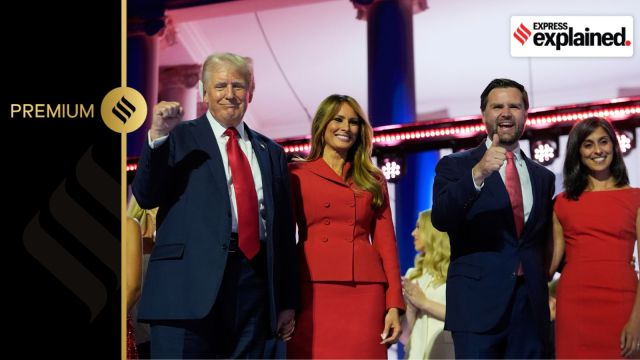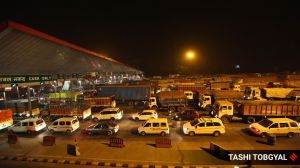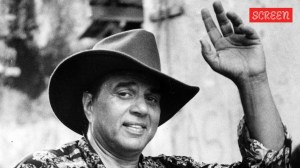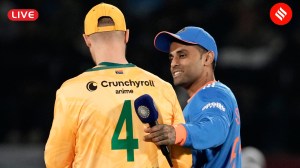Two days after he escaped attempted assassination — and immediately raised a defiant fist in what has become the defining image of his campaign to win back the White House — Donald Trump picked J D Vance, the junior Senator from Ohio, to be his running mate for the November election.
Vance, 39, is the first millennial on the ticket and, if elected, will be the youngest Vice President of the United States since the Civil War. The nomination has generated understandable interest in India because of his Indian-origin wife, whose extended family is from Andhra Pradesh.

Usha Vance Chilukuri, a successful corporate litigator, is described by Vance in his best-selling book, Hillbilly Elegy, as the “super smart daughter of Indian immigrants”. Two other Indian Americans, Nikki Haley and Vivek Ramaswamy, ran for the Republican presidential ticket. On the Democratic side, Vice President Kamala Harris, who could even be the nominee against Trump should President Joe Biden step aside, traces her roots on her mother’s side to Chennai.
Indian-origin immigrants make up just under 1.5% of the American population, but are successful stars in a range of fields. Indian American CEOs run Google, Microsoft, IBM, Adobe, and Starbucks for example, and Indian Americans have the highest median household income in the US by ethnic group. Their success story has been tapped by Prime Minister Narendra Modi in his outreach to the Indian diaspora in the US since 2014 when he addressed a gathering at Madison Square Garden, and his slogan of “Abki baar Trump sarkar” at the Howdy Modi rally in Houston in September 2019 rings a bell to many in the Trump campaign.
What could a Trump-Vance administration — a distinct possibility based on current poll numbers — look like from New Delhi?
CHINA: In his statements on foreign policy, Senator Vance has identified China as a primary strategic competitor, and has called for a more assertive US response to Beijing’s rising influence.
Earlier this year, he told the Munich Security Conference that US foreign policy should focus on East Asia for the next 40 years — and in an interview with Fox News this week, he identified China as the “biggest threat to our country”.
Story continues below this ad
Vance is seen as a fiercer trade warrior than Trump (who pledged in an interview with Bloomberg this week to erect high tariff walls against China), and co-sponsored legislation last year seeking to block access for China’s government to US capital markets if it failed to abide by international trade law.
The 2024 party platform of the Republican National Committee, which was approved at the national convention this week, calls for the revocation of China’s most favoured nation status.
All this is perceived as good news by many in the Indian foreign policy establishment — it is also in sync with the way Trump framed China as the strategic rival of the US, the first time a US President directly identified China as a threat.
EUROPE & RUSSIA: According to Indian diplomats who track Republican policy in the US Congress, Vance believes in maintaining alliances with key partners in Europe and Asia to address common security challenges. He has not identified India as a partner yet, but Trump himself was clear on this issue during his 2016-20 presidency.
Story continues below this ad
What has triggered concern in Europe is Vance’s stand against the US providing funds to Ukraine for the war with Russia. He suggested in Munich that Ukraine should negotiate with Russia because the West does not have the capacity to keep backing it, and he told the National Conservatism Conference recently that US involvement in Ukraine had “no obvious conclusion or even objective that we’re close to getting accomplished”.
Like Trump, Vance has demanded that Europe shoulder a bigger share of the cost of defending the continent against Russia, so the US can concentrate on tackling what it sees as threats posed by China. “We want Europe to be successful, but Europe has got to take a bigger role in its own security,” he said in Munich.
While Europe is alarmed at this framing, the Indian establishment views this as an approach that might allow Washington to focus resources in the Indo-Pacific. India’s own engagement with Russia — Modi hugged President Vladimir Putin in Moscow, much to the discomfort of the Europeans — can be expected to age well if the Republicans are able to reclaim the White House.
MIDDLE EAST: Vance is a staunch supporter of Israel, who has rejected any limits on US aid to the Jewish nation. In a letter written to Biden last November, Vance described Palestinians as “a population of potentially radicalized individuals”. He has introduced bills to withhold federal funds for colleges where there have been encampments or protests against Israel’s war in Gaza.
Story continues below this ad
This position puts India in a delicate diplomatic spot, since New Delhi has sought to balance its ties with Israel and Palestine, and has consistently given aid to the Palestinian establishment in the West Bank.
IMMIGRATION: There are some concerns that a Trump-Vance administration may place restrictions on immigration that could potentially impact Indians seeking to go to the US for education and jobs. A more transactional approach to trade, with duties and tariffs on Indian goods and services in sync with Trump’s ‘America First’ policy, could present some irritants.
Importantly, Vance is seen as being open to “negotiation and improvisation”. And Trump himself has often advocated doing “deals” to resolve issues.
Mathew Continetti, a fellow at the American Enterprise Institute and the author of The Right: The Hundred Year War for American Conservatism, told The New York Times: “Vance and his comrades have assembled a thick portfolio of ideas… While he agrees with the populists on immigration, trade and entitlements, he has been less inclined to regulate labour markets, redistribute income… And he always leaves considerable room for negotiation and improvisation.”








































